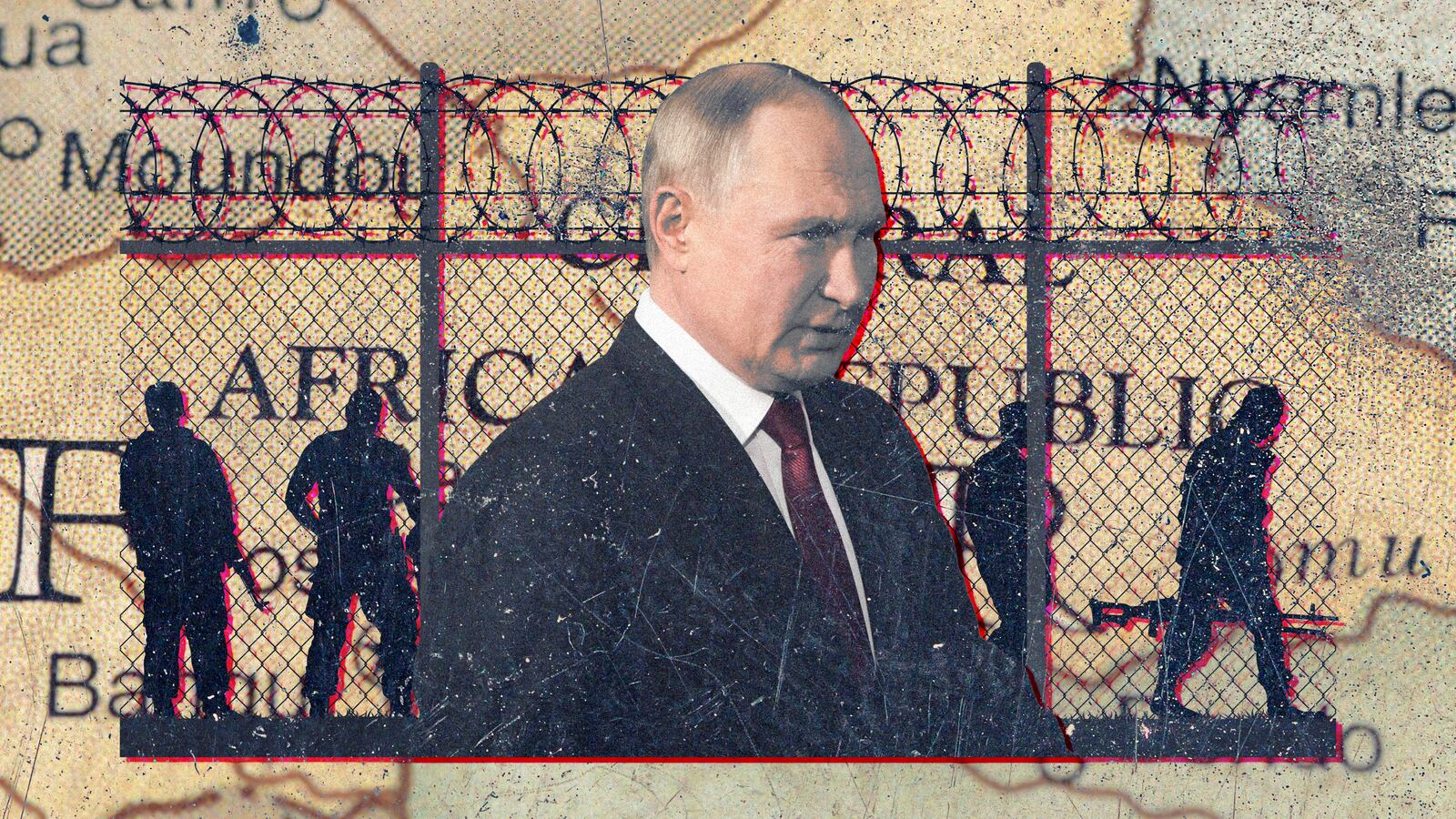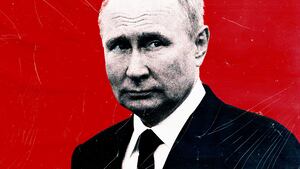ABUJA, Nigeria—Russia’s infamous Wagner Group is freeing hardened rebels held in jail cells in the Central African Republic and deploying them overseas, including in Ukraine’s eastern Donbas region, two senior military officers in CAR told The Daily Beast.
According to the sources in CAR, where armed rebels have controlled large parts of the country for about a decade, dozens of men held in military and police custody for crimes such as rape and murder are now being recruited into Wagner’s local wing, which includes hundreds of fighters commonly referred to as “Black Russians.” Many of the recruits, the officers said, are rebels the military consider to be terrorists because of their unlawful use of violence and intimidation against civilians and armed forces in pursuit of political aims.
“Since October, they [Wagner paramilitaries] have been walking into military and police cells and releasing rebels, including those held for attacking Bokolobo village [in southern CAR] in May and for raping women and girls,” an officer who works at the military headquarters in CAR’s capital, Bangui, told The Daily Beast. “Nobody can stop them because the government has given them so much power to act the way they want.”
Another military officer told The Daily Beast that rebels held for attacking and killing CAR soldiers during an assault on a military camp in the southeastern town of Bakouma town in April have also been freed by Russian mercenaries. The officer said Wagner paramilitaries told military officials that the released rebels would be working for the group overseas.
“They [Wagner] said they needed urgent manpower in Mali and Ukraine,” the officer, who works with CAR’s army, told The Daily Beast. “I think more than 20 people we’ve been holding [for very serious crimes] have been released.”
Many of CAR’s high-risk criminals, particularly rebels accused of harming, raping, and killing civilians are held in military and police cells rather than in understaffed and poorly secured conventional prisons. Although the detainees are under the custody of local forces, Wagner mercenaries—who’ve been active in CAR since the government turned to Russia for help in securing arms and paramilitaries in 2017—continue to exert influence over the Central African nation’s security agencies.
Among the prisoners released by Russian mercenaries is a notorious fighter from the Union for Peace (UPC) rebel group known by his colleagues as Mohammed, according to a former UPC member. The released rebel fighter is believed to have been involved in the Bokolobo attack in May. He allegedly joined Wagner’s local unit in late October and is now among the dozens of Black Russians believed to have been deployed to Ukraine.
“[Mohammed] and four others were accused of raping and killing civilians in Bokolobo and detained for months by soldiers at Camp du Kassaï [in Bangui],” Ali, who was recruited by Wagner Group after quitting UPC last December, told The Daily Beast. “We were surprised to see that he had become a Black Russian and was even shortlisted for Ukraine.”
Before Russia invaded Ukraine, according to Ali, whose name—like other sources—The Daily Beast has changed to protect him from possible retribution, rebels arrested by Russian mercenaries or CAR forces were often executed while in custody.
“They’ll kill you [while in custody] and bring your dead body back to the same place you were arrested and dump it there,” Ali said. “They did that to many of our colleagues.”
But at the moment, said Ali, rebels who are arrested by Wagner or CAR forces are more likely to enter into negotiations with the Russians than be punished. “They even offer you money to join [Wagner], and for many people that is far better than even being a rebel,” he said.
In October, the Russians also allegedly released a man known by his colleagues as Little Bouba.
According to another former UPC rebel who later became a Black Russian, Little Bouba was arrested around June after being accused of helping mastermind attacks on CAR forces in the east of the country in February.
“He was accused of butchering soldiers,” said Hassan, who—like Ali—was recruited by the Wagner Group after quitting UPC last December. “Now, he's a Black Russian because they need him to fight in Ukraine.”
Wagner mercenaries have also made attempts to pick up inmates from CAR prisons but have not had much luck. In June, an Egyptian contingent attached to the United Nations Multidimensional Integrated Stabilisation Mission in the Central African Republic (MINUSCA) prevented some Russian mercenaries from releasing five prisoners from the Roux military prison in Bangui, according to HumAngle, a West African publication. The outlet reported that among those the Russians tried to release was Tidjani Hamit, a former rebel of the Patriotic Front for the Renaissance of the Central African Republic (PFRC) who was arrested six years ago by MINUSCA in Subit.
The Wagner Group is already using prisoners to fight Russia's war in Ukraine. In July, Yevgeny Prigozhin, the Wagner supremo, began touring Russian prisons in an increasingly desperate bid to recruit more soldiers to send into Ukraine. He was later accused of using “pressure” to recruit raped and abused prisoners from Russia’s penal colonies to join the mercenary group’s frontline fighting units, where they are being slaughtered with little training and poor equipment.
In Russia, Prigohin has reportedly recruited over 6,000 prisoners to fight in Ukraine, promising them amnesty and a monthly salary between $1,500 and $3,000 a month. There is no clear salary structure for those Wagner recruits in CAR. In fact, Central Africans who were allegedly sent to Ukraine in March are said to have been left stranded and starving after being abandoned in the Donbas region by Wagner, as The Daily Beast previously reported.
When Ali and Hassan joined hundreds of rebels from the UPC in surrendering to government forces last December, they were told that they would work closely with CAR troops and Wagner mercenaries to fight other rebels and would be paid close to $1,000 every month, according to both men. It was an incentive that was lucrative enough to make the rebels switch sides.
But the money, the two men said, was not regularly paid and some Black Russians stopped getting paid altogether after a few months. Despite not meeting its financial obligations, they said, Wagner continued to recruit local fighters but focused only on those in jail.
“Since July, they [the rebels initially arrested and held for very serious crimes] are the ones that have been joining,” said Hassan. “There were rumors that some of them would be sent to Ukraine for war.”
Neither the CAR government nor Prigozhin has responded to emails sent to them by The Daily Beast requesting comments on the allegations that Wagner has been recruiting criminals from jail cells. Emails sent to the spokesperson of the CAR government and to Concord Management, a company majority-owned by Prigozhin, went unanswered.
Ali and Hassan left the Black Russians early in November after they stopped receiving payment from Wagner. Dozens of their colleagues, particularly those recruited from prison, allegedly began to disappear in recent months. The two believe that their missing former colleagues—about 50 in number—are fighting for Russia in Ukraine, but are convinced they have been abandoned.
“They [Wagner] are just taking people away without even informing their families,” said Ali. “If things go wrong, no one would know what happened to them.”







